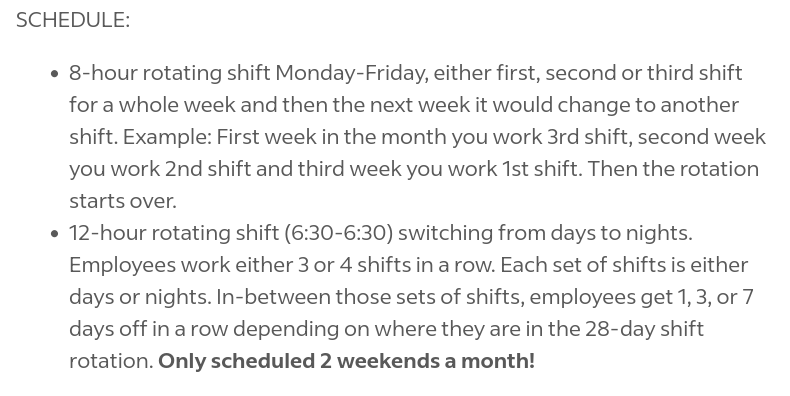Are there no shift differentials? This is probably a way to avoid paying a bump to fill off-peak shifts.
Too tired to look for a better job?
I would assume it's because each hour an expensive machine is not being used is going to waste and if machine goes obsolete in 10 years and being replaced - there is a difference between it doing 30k hours of work and 90k. I'm not sure if that's the reason, but that would make sense to me personally.
They want to keep production rolling continuously to avoid the lag of shutting down and starting the machinery back up again, but they also know how few people are around who'll willingly work the graveyard shift so they're basically trying to package it into the job no matter what so that they don't have to negotiate for volunteers, because now it's part of the job description contract you signed!
Have fun keeping machines running with enough workers, or when accidents happen because workers are too tired.
By keeping you rotating they don't have to pay you extra.
I don't know either, but there were so so many jobs I didn't even apply for because of this very thing. Seems like more places need unions
The managers schedule at a trader Joe's is Start the week working 4am to 2pm. End the week working 2 pm to midnight. Every week.
My theory is so you cant work a second job thus reducing risk of accidents. Just a theory though.
Productivity. It gives the company and increase productivity when you have fresh-ish workers vs burnt out ones in the "undesirable shifts" and have to pay them a fuck ton more to work those shifts to compensate those who have to constantly work those other shifts. But rotating shifts like this really screws up worker health and their circadian rhythm but hey, more profit for the company.
Ask Lemmy
A Fediverse community for open-ended, thought provoking questions
Rules: (interactive)
1) Be nice and; have fun
Doxxing, trolling, sealioning, racism, and toxicity are not welcomed in AskLemmy. Remember what your mother said: if you can't say something nice, don't say anything at all. In addition, the site-wide Lemmy.world terms of service also apply here. Please familiarize yourself with them
2) All posts must end with a '?'
This is sort of like Jeopardy. Please phrase all post titles in the form of a proper question ending with ?
3) No spam
Please do not flood the community with nonsense. Actual suspected spammers will be banned on site. No astroturfing.
4) NSFW is okay, within reason
Just remember to tag posts with either a content warning or a [NSFW] tag. Overtly sexual posts are not allowed, please direct them to either [email protected] or [email protected].
NSFW comments should be restricted to posts tagged [NSFW].
5) This is not a support community.
It is not a place for 'how do I?', type questions.
If you have any questions regarding the site itself or would like to report a community, please direct them to Lemmy.world Support or email [email protected]. For other questions check our partnered communities list, or use the search function.
6) No US Politics.
Please don't post about current US Politics. If you need to do this, try [email protected] or [email protected]
Reminder: The terms of service apply here too.
Partnered Communities:
Logo design credit goes to: tubbadu

